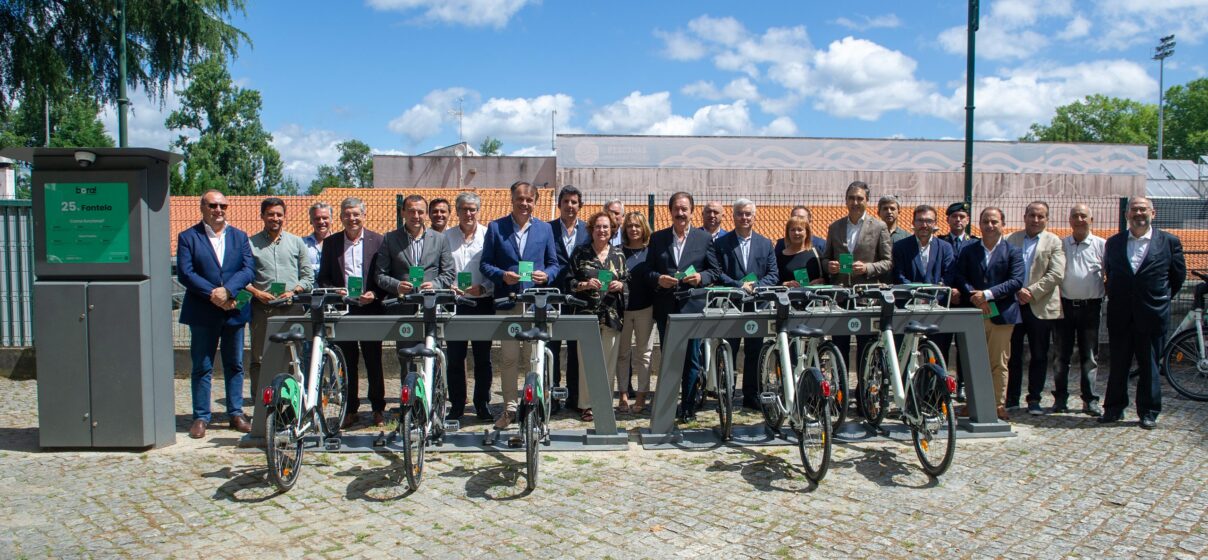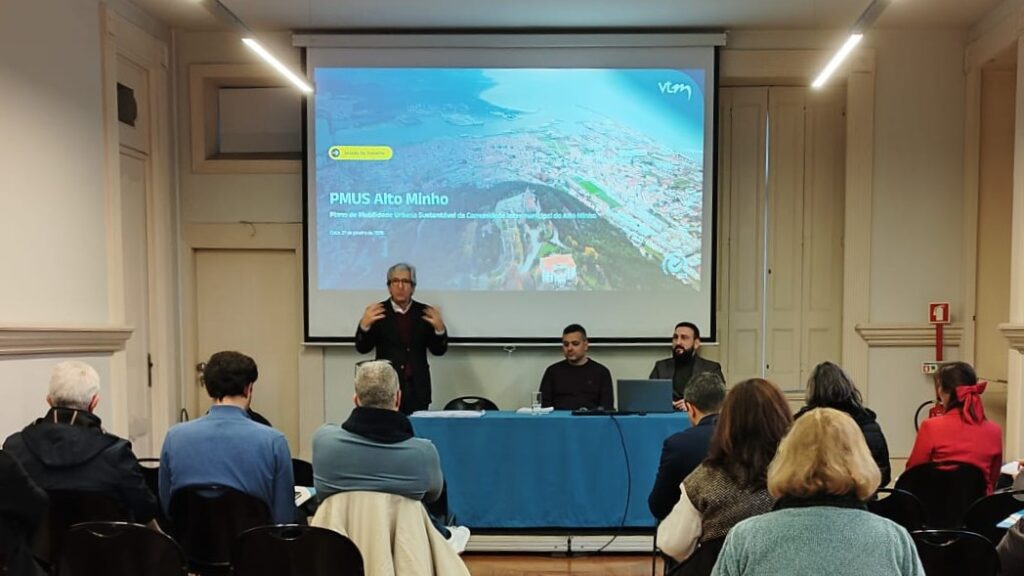The Viseu Dão Lafões Intermunicipal Community presents new bike sharing service

A new bike sharing service was presented in the past days in Viseu Dão Lafões Intermunicipal Community (CIM Viseu Dão Lafões). This represents one of the sustainable mobility measures planned for the area: at VTM, we are proud to have supported CIM Viseu Dão Lafões in the development of the local sustainable mobility plans, which mark a significant step towards sustainable mobility with the aid of community funds.
In recent years, the increased use of individual motorised transport in many European regions has resulted in severe traffic congestion, deteriorating air quality and an overall decline in quality of life (Kroesen, 2017; De Ceunynck et al., 2021; König et al., 2022). To address these challenges, sustainable mobility has emerged as a critical solution, emphasising the reduction of trips, decreased dependence on motorised vehicles, and mitigation of greenhouse gas emissions and other pollutants (Möser & Bamberg, 2008; Singh, 2019). This approach also advocates for the prudent use of non-renewable resources, equitable access to mobility for all, and efficient management of public financial resources (Ambrosino et al., 2016; Zawieska & Pieriegud, 2018; Edge et al., 2020).
To address the negative impacts of the transport and mobility sector, over the past decade the European Union (EU) has introduced a series of initiatives and developed policies that foster sustainable mobility. The European Green Deal and the European Climate Law are two key-frameworks supporting the transition towards sustainable mobility. The European Green Deal has the objective of making Europe the first climate-neutral continent by 2050, while the European Climate Law is designed to facilitate a reduction in greenhouse gas emissions by at least 55% by 2030 in comparison to 1990 levels.
In line with these EU directives, regions and cities across Europe have developed their own strategies to contribute to more sustainable transport systems. For instance, over the last decade micromobility has gained widespread recognition as a complement to public transport and a viable alternative to reduce reliance on private cars for short-distance trips (Albuquerque et al., 2018; Félix et al., 2020; Abduljabbar et al., 2021). Nevertheless, the implementation of micromobility systems requires substantial investments and technical support.
VTM has been actively involved in several projects aimed at preparing applications for European funds that support sustainable mobility. One such project involved the Transport Authority CIM Viseu Dão Lafões, which aimed to enhance the mobility of its 14 municipalities through the implementation of a bike sharing system.
The latest census data indicates that the use of individual motorised transport, particularly cars, has increased by 6% in the Viseu Dão Lafões region between 2011 and 2021. By 2021, the proportion of trips made by car in Viseu Dão Lafões had reached 75%, compared to 66% at the national level. In the same year, 13% of trips were made on foot, 10% by public transport and approximately 1% by bike. In light of these circumstances, CIM Viseu Dão Lafões has established a commitment to facilitate a paradigm shift in the region, aiming to promote more sustainable transport alternatives over individual motorised modes, by encouraging the use of public transport, walking, and cycling.
CIM Viseu Dão Lafões’s strategic efforts have resulted not only in the development of sustainable mobility plans, such as the Sustainable Urban Mobility Action Plan for Viseu Dão Lafões (PAMUS Viseu Dão Lafões), the Viseu Dão Lafões Intermunicipal Mobility and Transport Plan (PIMT Viseu Dão Lafões) and the Strategy for Improving School Mobility in Viseu Dão Lafões, but also in specific measures developed to support this paradigm shift. One such measure was, indeed, the implementation of the bora! public bike-sharing system, with the support of community funds. The bora! system, which was successfully launched in July 2024, is currently available in all 14 municipalities, comprising 39 stations, 245 docks, and 153 bikes.
We congratulate CIM Viseu Dão Lafões on this significant achievement and commend them for their dedication and commitment to promoting sustainable mobility in their territory. We firmly believe that this initiative will successfully facilitate the transition to more sustainable transport modes in Viseu Dão Lafões, while promoting public health, reducing pollution, and enhancing the overall quality of life.
References
- Abduljabbar, R. L., Liyanage, S., & Dia, H. (2021). The role of micromobility in shaping sustainable cities: A systematic literature review. Transportation Research Part D: Transport and Environment, 92, 102734.
- Albuquerque, V., Andrade, F., Ferreira, J., Dias, M., & Bacao, F. (2018). Bike-sharing mobility patterns: A data-driven analysis for the city of Lisbon. EAI Endorsed Transactions on Smart Cities, 169580.
- Ambrosino, G., Nelson, J. D., Boero, M., & Pettinelli, I. (2016). Enabling intermodal urban transport through complementary services: From Flexible Mobility Services to the Shared Use Mobility Agency. Research in Transportation Economics, 59, 179–184.
- Comissão Europeia (2018). Regulamento (UE) 2018/1999 (Lei Europeia do Clima). Que estabelece o quadro para alcançar a neutralidade climática.
- Comissão Europeia (2019). Pacto Ecológico Europeu COM(2019) 640 final, Comunicação da Comissão ao Parlamento Europeu, ao Conselho Europeu, ao Conselho, ao Comité Económico e Social Europeu e ao Comité das Regiões.
- De Ceunynck, T., Wijlhuizen, G. J., Fyhri, A., Gerike, R., Köhler, D., Ciccone, A., Dijkstra, A., Dupont, E., & Cools, M. (2021). Assessing the Willingness to Use Personal e-Transporters (PeTs): Results from a Cross-National Survey in Nine European Cities. Sustainability, 13(7), 3844.
- Edge, S., Goodfield, J., & Dean, J. (2020). Shifting gears on sustainable transport transitions: Stakeholder perspectives on e-bikes in Toronto, Canada. Environmental Innovation and Societal Transitions, 36, 197–208.
- Félix, R., Cambra, P., & Moura, F. (2020). Build it and give ‘em bikes, and they will come: The effects of cycling infrastructure and bike-sharing system in Lisbon. Case Studies on Transport Policy, 8(2), 672–682.
- König, A., Gebhardt, L., Stark, K., & Schuppan, J. (2022). A Multi-Perspective Assessment of the Introduction of E-Scooter Sharing in Germany. Sustainability, 14(5), 2639.
- Kroesen, M. (2017). To what extent do e-bikes substitute travel by other modes? Evidence from the Netherlands. Transportation Research Part D: Transport and Environment, 53, 377–387.
- Möser, G., & Bamberg, S. (2008). The effectiveness of soft transport policy measures: A critical assessment and meta-analysis of empirical evidence. Journal of Environmental Psychology, 28(1), 10–26.
- Singh, Y. J. (2019). Is smart mobility also gender-smart? Journal of Gender Studies, 29(7), 832–846.
- Zawieska, J., & Pieriegud, J. (2018). Smart city as a tool for sustainable mobility and transport decarbonisation. Transport Policy, 63, 39–50.
Latest news
All news
Collaborative mobility planning takes a major step forward in Alto Minho
This week, Ponte de Lima hosted an important milestone for sustainable mobility in the Alto Minho region, with the working sessions of the 2nd-generation Sustainable Urban Mobility Plan of Alto Minho (SUMP Alto Minho), promoted by CIM Alto Minho. At VTM, we are proud to support CIM Alto Minho in the development of a new-generation […]

VTM welcomes Oriol Riba and Alessandra Bernardi
VTM is pleased to announce the addition of two highly experienced professionals, Oriol Riba and Alessandra Bernardi, further strengthening our capabilities across infrastructure advisory and transport modelling. Oriol Riba joins VTM as a Senior Associate Director with more than fourteen years of experience in the infrastructure sector, with a strong focus on transport and additional exposure to energy […]
